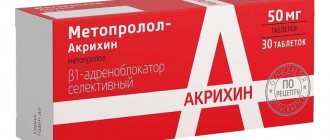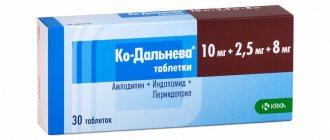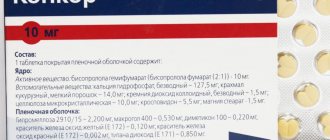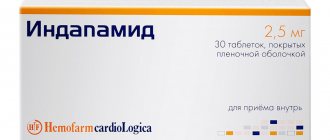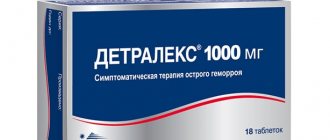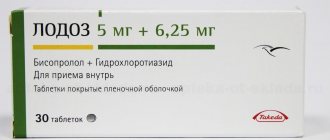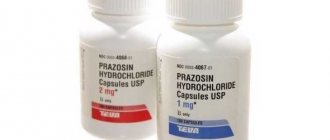Taking Prestance tablets is recommended for patients who suffer from constantly high blood pressure, since the drug has a hypotensive effect. The international nonproprietary name (INN) of the drug is “Amlodipine” and “Perindopril”. The manufacturer informs that before taking a pharmaceutical drug, it is necessary to take into account its compatibility with other medications in order to avoid unpleasant symptoms. Each box contains an annotation indicating possible side effects and cases when Prestance is not recommended for use.
Features of the drug
Composition and release form
Country of origin: France. The main components of the drug are perindopril arginine and amlodipine besylate. Medicines are produced in tablet form, which may have different variations, presented in the table:
| Combination | Component content, mg | |
| Perindopril | Amlodipine | |
| 5/5 | 3,395 | 6,935 |
| 5/10 | 13,870 | |
| 10/10 | 6,790 | |
| 10/5 | 6,935 | |
To enhance the hypotensive effect, Prestance blood pressure tablets contain excipients, namely:
- microcrystalline cellulose;
- magnesium stearate;
- lactose monohydrate;
- colloidal silicon dioxide.
Mechanism of action
The drug successfully normalizes blood circulation in the patient’s body.
Even after taking one tablet, the patient's blood pressure levels decrease. The drug is aimed at inhibiting calcium channels and angiotensin-converting enzyme. Thanks to perindopril, the conversion of antiotensin I to a similar type 2 substance is inhibited. Thanks to this, the components have the following effect on the patient’s body:
- pressure decreases;
- blood circulation is normalized;
- the heart rate does not change.
With the help of amlodipine, which is part of the Prestance tablets, it is possible to achieve the following effects:
- reduce the load on the myocardium;
- prevent the development of a heart attack;
- prevent an attack of angina pectoris;
- eliminate the likelihood of death due to pathologies of the cardiovascular system.
It is allowed to take Prestance for a long time, since it is not addictive and does not provoke unpleasant symptoms after discontinuation of treatment.
special instructions
Perindopril
- Anaphylactoid reactions during low-density lipoprotein apheresis: in rare cases, when using dextran sulfate, anaphylactoid reactions that pose a threat to life may develop (temporary discontinuation of therapy is indicated before each procedure);
- Hypersensitivity/angioedema: in some cases, angioedema of the face, lips, extremities, tongue, mucous membranes, larynx and/or vocal folds may develop (immediate discontinuation of therapy is required, antihistamines are prescribed if necessary), Quincke's edema (especially when indicated in history), angioedema of the intestine (symptoms: abdominal pain alone or in combination with nausea and vomiting; diagnosed using ultrasound, computed tomography of the abdominal area or at the time of surgery);
- Neutropenia, thrombocytopenia, agranulocytosis, anemia: due to the likelihood of developing these disorders, special caution should be exercised in patients with systemic connective tissue diseases when combined with immunosuppressants, allopurinol or procainamide, especially with renal impairment;
- Anaphylactoid reactions during desensitization (for example, using the venom of hymenoptera insects): with the development of these reactions, temporary withdrawal of angiotensin-converting enzyme inhibitors is indicated;
- General anesthesia/surgical interventions: major surgical interventions and/or general anesthesia with the use of general anesthetic agents with a hypotensive effect can lead to a marked decrease in blood pressure (it is recommended to warn the anesthesiologist/surgeon about taking the drug and discontinue therapy 24 hours before surgery;
- Severe infections, which in some cases show resistance to intensive antibiotic therapy: such patients are recommended to periodically monitor the number of leukocytes in the blood;
- Arterial hypotension: there is a possibility of a sharp decrease in blood pressure (rare in the absence of concomitant diseases; the risk of development is increased with a reduced volume of circulating blood (associated with diuretic therapy, adherence to a strict salt-free diet, hemodialysis, diarrhea and vomiting) and severe arterial hypertension with high activity renin. If arterial hypotension develops, the patient should be transferred to a horizontal position with legs elevated, and if necessary, the circulating blood volume should be replenished. After improvement (replenishment of circulating blood volume and blood pressure), therapy can be continued;
- Mitral and aortic stenosis, hypertrophic obstructive cardiomyopathy: special caution is required when prescribing the drug for obstruction of the left ventricular outflow tract (hypertrophic obstructive cardiomyopathy, aortic stenosis) and mitral stenosis;
- Liver failure: in some cases, cholestatic jaundice develops (therapy discontinuation is required);
- Functional renal impairment: with creatinine clearance less than 60 ml/min, individual selection of doses of perindopril and amlodipine is recommended;
- Ethnic differences: angioedema develops more often in patients of the Negroid race;
- Cough: a dry cough may develop (you must remember the possible iatrogenic nature of this symptom);
- Patients with diabetes mellitus: while using oral hypoglycemic agents or insulin, blood glucose concentrations should be carefully monitored during the first month of treatment;
- Hyperkalemia: during therapy, hyperkalemia may develop (the use of potassium-sparing diuretics, potassium supplements, potassium-containing table salt substitutes, especially with reduced renal function, can lead to a significant increase in the potassium content in the blood).
Amlodipine
- Hypertensive crisis: safety profile has not been studied;
- Heart failure: therapy requires caution; when used in patients with chronic heart failure of functional class III and IV according to the NYHA classification, pulmonary edema may occur. Due to the possible increased risk of cardiovascular adverse events and mortality, amlodipine is prescribed with caution in patients with chronic heart failure;
- Liver failure: in case of functional liver disorders, amlodipine should be started with the lowest doses, taking precautions at the beginning of treatment and when increasing the dose. In severe liver failure, the dose should be increased gradually, carefully monitoring the clinical condition;
- Functional kidney disorders: it is necessary to monitor the condition;
- Elderly patients: due to the increased half-life and decreased clearance of amlodipine, careful monitoring of this category of patients is necessary.
Due to the likelihood of an excessive decrease in blood pressure, drowsiness, dizziness and other adverse reactions, caution is recommended when driving vehicles and other complex mechanisms, especially at the beginning of therapy and when increasing the dose.
When to use: indications
The drug will be effective at any stage of ischemic pathology in humans.
The instructions for use of the drug "Prestance" indicate that it is better to take the tablets as prescribed by the doctor. It is recommended to use the tablet if your blood pressure is constantly elevated. The drug is also used to treat or prevent the occurrence of cardiac and vascular pathologies. Prestance can be used to treat ischemic disease of varying severity. If you take the medicine in accordance with the prescribed dose, you can reduce the likelihood of developing a heart attack and death due to problems in the functioning of the cardiovascular system.
Prestation in case of impaired renal or liver function
The drug is contraindicated in patients with creatinine clearance less than 60 ml per minute.
As for renal failure, for patients with mild and moderate forms, an individual selection of the dosage of the active components is carried out separately.
The drug is prescribed from the permissible dosage (minimum) and then gradually increases. In this case, regular monitoring of liver function is necessary, as well as the body’s response to the treatment.
Instructions for use
Positive effects are achieved only when the patient uses the drug “Prestance” strictly in the specified dosage. It is recommended to take the drug in the morning on an empty stomach. You need to take the tablets once a day, but for special indications the dosage of Prestance may be increased. The maximum permissible daily dose is 10 mg. If medication for blood pressure is prescribed to older people, careful monitoring of creatinine and potassium levels in the blood is required. It is strictly forbidden to drink alcohol during therapy, as it may aggravate the course of the pathology.
Composition and release form
This medicine is available in tablet form. Due to its composition, this remedy has two effects at once, antihypertensive and antianginal. The tablets themselves are white, on one side of which you can see the manufacturer’s logo, and on the other the dosage is indicated.
This drug is available in the following variations:
- Dosage consisting of 5 ml of amlodipine and the same amount of perindopril.
- Composition containing 5 mg of perindopril and 10 mg of amlodipine.
- The most optimal dosage is considered to be 10 mg of both active substances.
- The tablets, visually looking like small triangles, contain 10 mg of perindopril and only 5 mg of amlodipine.
The required dosage of the drug Prestance for blood pressure is determined by the doctor, based on the clinical picture of the disease itself, as well as the individual characteristics of the patient.
Is it allowed during pregnancy?
It is better not to take this drug during gestation.
If a woman is just planning to have a child or is in the early stages, then she should stop taking Prestance and replace it with a safer drug to stabilize blood pressure. They should also refrain from using the medicine during the 2nd-3rd trimesters, since kidney abnormalities in the unborn child or disturbances in the formation of the cranial bones are likely.
"Prestans": price and reviews
If you believe the instructions for use, then such a drug is not addictive, and even if you abruptly stop using it, there is no withdrawal syndrome. These tablets should be stored in a cool place away from sunlight. Their shelf life is no more than 2 years.
The drug "Prestans", the price of which in Russia ranges from 560-970 rubles, is a prescription medicine. Therefore, you cannot buy it without a doctor’s prescription.
The drug "Prestans", reviews of which are both positive and negative, helps many people improve their condition. This difference of opinion is due to the fact that everyone’s body is unique, so this drug is suitable for some, but not for others.
As a rule, good reviews note that these tablets quickly relieve heart pain and stabilize blood pressure. However, you can also find negative opinions that complain about side effects. In addition, for some people the drug is expensive, so they prefer to buy the Prestanza analogue.
Contraindications for use
In the register of medicines (RLS), Prestance is classified as a drug with a strong effect, so it can only be purchased with a doctor’s prescription. Avoid taking medication in the following cases:
- individual intolerance to the components of the drug "Prestans";
- severe hypertension;
- cardiogenic shock;
- aortic blockage;
- kidney or heart failure;
- pathological manifestations after myocardial infarction;
- children under 18 years of age;
- bearing a child and lactation period;
- obstruction of blood flow in the outflow tract of the left ventricle.
Indications and rules of admission
The presented drug is taken one tablet once a day. It is best to do this in the morning before the main meal. In some cases, the doctor first tests certain dosages of active substances on the patient in order to select the most suitable version of Prestance. It is important to consider that the maximum dosage is 10 mg of amlodipine and the same amount of perindopril.
For elderly patients, as well as those who suffer from renal failure, and whose body does not remove the substance perindopril well, the dosage of the drug is selected with special care. People under 18 years of age are not allowed to use the medicine. Most often, the medicine is prescribed for chronic ischemia, hypertension and angina.
Possible side effects
Occasionally, patients may complain of drowsiness while taking the drug.
In rare cases, the drug "Prestance" provokes negative reactions, as a result of which the pressure increases even more or rapidly decreases. The table shows the negative symptoms that a patient may experience after taking the pills:
| System | Violations |
| Hematopoietic | Decreased hemoglobin level |
| Signs of leukopenia and neutropenia | |
| Central nervous | Constant desire to sleep |
| Dizziness and headaches | |
| Sleep problems leading to insomnia | |
| Depressive state | |
| Tremor of the lower and upper extremities | |
| Metabolism | Unstable body weight |
| Excessive levels of potassium and creatinine in the body | |
| Sense organs | The appearance of tinnitus |
| Impaired visual function, causing objects to become blurry | |
| Cardiovascular | Increased heartbeat |
| Facial redness | |
| A sharp decrease in pressure | |
| Development of myocardial infarction | |
| Respiratory | Shortness of breath and coughing fit |
| Bronchospasms | |
| Gastrointestinal tract | Nausea leading to vomiting |
| Pain in the abdomen | |
| Inflammatory reaction in the stomach and pancreas | |
| Drying of the oral mucosa | |
| Problems with stool | |
| Urinary | Frequent trips for minor needs |
| Renal dysfunction | |
| Musculoskeletal | Pain attacks in the lumbar region |
| Muscle spasms | |
| Swelling in the ankle area |
In men, after using Prestance tablets, potency may decrease. Also, adverse reactions often occur when the drug is combined with alcohol.
Directions for use and dosage
Patients who are quite elderly and those who suffer from pathologies of kidney function must definitely use a medication with a volume of perindopril in it of no more than 5 mg. This is based on impaired excretion of the drug. Such people require detailed monitoring of total potassium levels and creatinine clearance.
For example, if this parameter is less than 60 ml/min, the use of Prestance is a contraindication.
If a patient has liver dysfunction, professionals may prescribe the drug with caution, starting therapy with the lowest possible dosage.
Cases of overdose
A high dose of medication can cause dizziness in a person.
If a person with high blood pressure does not adhere to the prescribed dosage, then the following unpleasant symptoms are likely:
- signs of tachycardia;
- state of shock;
- disturbed electrolyte balance;
- kidney failure;
- dizziness;
- rapid drop in pressure.
Indications for use
The drug Prestance has the following indications for use:
- the occurrence of isolated cases of increased blood pressure in a person;
- chronic form of hypertension;
- treatment of coronary heart disease, in which the pumping of blood to the heart is significantly reduced;
- cardiac ischemia;
- angina pectoris of varying severity.
Effect on blood pressure
This medicine contains 2 types of active ingredients. One type is a calcium antagonist and has the following effects on the body:
- effectively expands the lumen of small arteries;
- normalizes blood flow in the coronary vessels.
The second type of substance in its action is an ACE inhibitor. It effectively relieves symptoms of high blood pressure in humans due to the following effects:
- quickly and effectively dilates blood vessels;
- normalizes and improves blood circulation;
- has a restorative effect on the structure of arteries;
- prevents the development of complications after a heart attack.
Thus, Prestance is an effective medication that lowers blood pressure. This occurs due to the normalization of blood circulation in the arteries.

